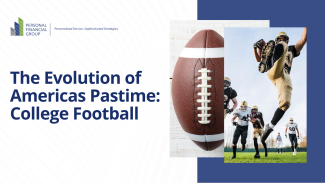
The Evolution of Americas Pastime: College Football
For more than 150 years, American college football has maintained its top-dog status in the U.S. sporting arena. On November 6, 1869—a mere four years after the end of the American Civil War—players from Rutgers and Princeton met on the field in New Brunswick, New York for the first intercollegiate football game.1 Eighty years later, after the end of World War Two, colleges began to award athletic scholarships to their football players to garner top talent.
Today, just about every major college football player receives a scholarship or stipend for tuition, room, board, and other expenses. In response to complaints about schools, video game producers, and other organizations profiting off players' fame, the NCAA recently made sweeping changes to its group licensing rules that will allow college players to finally capitalize on their names and likenesses.
What College Players Should Consider
Not all financial aid packages are created equal. Before accepting a college's offer, a student-athlete should consider factors like:
- Whether the aid package is contingent on maintaining a specific G.P.A.;
- Whether it provides tuition assistance based on the number of years attended, semesters attended, and/or credits taken (which can be important if playing sports will prevent you from completing your degree in four years);
- Whether it contains licensing restrictions in addition to those imposed by the NCAA; and
- Whether it can be modified in the event of injury or illness that prevents football play.
A generous offer may no longer seem so generous if it comes with a laundry list of contingencies that might not be met. By weighing the pros, cons, and restrictions of the various offers made, players can make the best possible choice for their circumstances.
Know Before You Go Pro
College athletes who plan to enter the NFL draft can be excited at the thought of hefty signing bonuses and annual salary contracts. However, these young athletes often overlook the relative brevity of their professional careers and the major bite that federal and state income taxes will take. Because football careers can often be cut short by injury, players who don't have a "Plan B" career can benefit from setting aside funds now to provide a reliable stream of income in the future.
It's important for anyone thinking of going pro to seek out the assistance of a financial professional. Not only can a professional advise on the most advantageous way to accept these funds (such as having a signing bonus paid out over multiple tax years), but they can also help direct investments and recommend products and services that will best preserve this newfound wealth.
Important Disclosures:
The opinions voiced in this material are for general information only and are not intended to provide specific advice or recommendations for any individual. To determine which investment(s) may be appropriate for you, consult your financial professional prior to investing. All performance referenced is historical and is no guarantee of future results. All indices are unmanaged and cannot be invested into directly.
The information provided is not intended to be a substitute for specific individualized tax planning or legal advice. We suggest that you consult with a qualified tax or legal advisor.
LPL Financial Representatives offer access to Trust Services through The Private Trust Company N.A., an affiliate of LPL Financial.
All information is believed to be from reliable sources; however LPL Financial makes no representation as to its completeness or accuracy.
1 https://www.collegesportsscholarships.com/history-ncaa-football.htm
Sources

